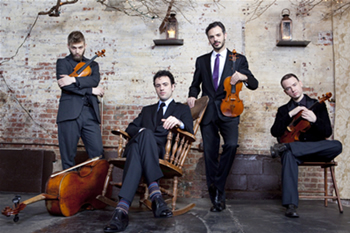Burning Coal Theatre Company‘s current stage production, performed at their thrust space in the Murphey School Auditorium on Polk Street in Raleigh, is Athol Fugard‘s The Road to Mecca, a compact, three-member-cast work that examines the role of the artist, and how she might fit, or not fit, into her community. It is a cautionary tale for the artist, admonishing Miss Helen (Raleigh’s own Lenore Field) through her young friend Elsa Barlow (Abbe Fralix) that she must pursue her art, and not give in to “the community,” personified by Helen’s friend, the Rev. Marius Bileveld (New York actor Brian Linden).
Miss Helen lives in the community of Karoo in South Africa, an area about 800 miles from Cape Town. Her home is compact but lovely, an artist’s retreat. Miss Helen is a sculptress, and her art peppers her front yard. Some of the forms she has created are a mermaid, the Three Wise Men, and several animals, including specifically owls, and also a comical figure of a man in the act of pulling up (or taking down, as the eye of the beholder shall decide) his pants. Helen says he is taking them up, but her friend Elsa says the opposite, as betrayed by his expression. Elsa tells Helen that his face portrays “anticipation, not satisfaction.”
Elsa has driven the 800 miles from Cape Town to see her friend because she is troubled by a letter Helen sent to her two weeks ago. In it, Helen confesses to feelings of depression and hints that she is losing everything: her home, her art, and maybe even her life. This sets off alarm bells, and Elsa, a schoolteacher, has come down as fast as she can, despite the fact that the school is in the middle of exams, and she is swamped with papers to grade. Helen tells her that she wrote the letter in a fit of despair, and that the “problem” is not so severe as it sounded in that letter. Elsa is not convinced. Helen – in the long conversation that precedes the arrival of her friend, Marius, a member of the local clergy – tells Elsa that she is being pressured to abandon this, her home, in exchange for a room at the local “Sunshine” old folks’ home. Despite this pressure, Helen is loath to take such a step. She is in the process of building her “Mecca,” a series of sculptures in her front yard (a reference to her namesake, Helen Martins, whose real-life “Owl House” is located in Karoo). She has, however, not created a thing in three months. She awaits inspiration in the form of a “Picture,” which will show her what and how her next project will progress. Her fear, she tells Elsa, is that the picture might never come. Elsa tells her that she must not dismiss her art, because it is her life’s work, and that work is not yet finished.
With the pressure from the community at large, and her friend Marius in particular, to shut down this house and retire to a home, Elsa tells Helen that she must not succumb to this pressure. She advises Helen to tell Marius “No” and return unsigned the home application he has prepared for her. This conversation immediately precedes the arrival of the man, whose appearance closes Act I. Act II is the actual argument had by Helen and Marius, with an able assist to Helen by Elsa.
Directed by Burning Coal’s artistic director, Jerome Davis, The Road to Mecca depicts Fugard’s caution to artists to take no heed of opposition to one’s art, and to pursue one’s calling with passion. This caution is signified in the play by a candle, a light burning in the darkness. It is this darkness that Helen fears. It might be the darkness of death, or simply the darkness of a snuffed pursuit of her art. To protect herself from this darkness, her home, which has no electricity, is filled with wax candles. In this way, Helen tries to defeat, in a literal sense, the darkness that she fears.
In their triangle of disagreement, Helen is admonished on the one hand by Marius to abandon this “nightmare” of a house and sculpture for a safe and protected retirement at Sunshine. He comes equipped with a studied and persuasive argument, and he presents it with affection and care for his old friend. But Elsa admonishes Helen to instead dismiss this careful and studied argument and to embrace her art. It is not the community’s place, in this case, to control Helen’s decision. If to end this life here in her home is to end her artistry, then the decision must be no. There is no argument to be made that she must cast off her calling to satisfy her friend’s and community’s desires by abandoning her art.
Fugard places this battle in Helen’s home, the very heart of her reality. Scenic designer Erin Morales gives us a quite detailed and simple home for Helen, which not only shows us where Helen lives, but also how. There are many windows, multicolored walls, and the various small indicators of an artist’s home: books stacked in piles around the living room, a simple writer’s desk under one window, and the bucket of water and washbasin Helen provides for Elsa’s “bath.” And, of course, there are a multitude of candles necessary to light the coming gloom of evening, and they keep Helen’s home out of the darkness that is a part of her nagging fear.
Director Davis has each character dealing with his or her own concept of reality. Marius comes to Helen’s home in an effort to bring Helen back to his reality, which is his “flock,” equipped with the tools he believes will convince her. Linden presented Marius as a benevolent guide; his arguments are those of safety, unity, and conformity. Elsa sees things from an entirely different perspective, and Fralix showed Elsa’s vigor in trying to win the argument about the need of an individual to conform. Field’s portrayal grippingly exhibited Helen’s struggle between safety and desire. It is this conflict that drives Act II and brings things to a head.
This second act is a heated and lively debate that the actors portrayed with passion and intelligence. Both sides of the argument were compellingly presented by Fralix and Linden. The actors’ performances were lively and invigorating: Linden was strong, Fralix was young and free, and Field was passionate.
In the end, Helen is convinced and makes her decision.
Road to Mecca continues through Sunday, December 19. For more details on this production, please view the sidebar.












